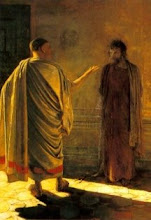Me thinks some things are happening in the Vatican. Several movements in the placement of Bishops to different offices as it relates to the Pontifical Commission "Ecclesia Dei".
The following is an English-language translation from the Italian of the Apostolic Letter "Motu Proprio data" of Pope Benedict XVI, "Ecclesiae unitatem".
Issued by the Vatican Press Office:
The document concerns the structure of the Pontifical Commission "Ecclesia Dei" which deals with questions involving the Society of Saint Pius X and which as of now becomes dependent upon the Congregation for the Doctrine of the Faith. The original text of the Motu Proprio is written in Latin:
1. The duty to safeguard the unity of the Church, with the solicitude to offer everyone help in responding appropriately to this vocation and divine grace, is the particular responsibility of the Successor of the Apostle Peter, who is the perpetual and visible principle and foundation of the unity of both bishops and faithful. The supreme and fundamental priority of the Church in all times - to lead mankind to the meeting with God - must be supported by the commitment to achieve a shared witness of faith among all Christians.
2. Faithful to this mandate, following the act of 30 June 1988 by which Archbishop Marcel Lefebvre illicitly conferred episcopal ordination upon four priests, on 2 July 1988 Pope John Paul II of venerable memory established the Pontifical Commission "Ecclesia Dei" whose task it is "to collaborate with the bishops, with the departments of the Roman Curia and with the circles concerned, for the purpose of facilitating full ecclesial communion of priests, seminarians, religious communities or individuals until now linked in various ways to the Society founded by Msgr. Lefebvre, who may wish to remain united to the Successor Peter in the Catholic Church, while preserving their spiritual and liturgical traditions, in the light of the Protocol signed on 5 May last by Cardinal Ratzinger and Msgr. Lefebvre".
3. In keeping with this, faithfully adhering to that duty to serve the universal communion of the Church, also in her visible manifestation, and making every effort to ensure that those who truly desire unity have the possibility to remain in it or to rediscover it, I decided, with the Motu Proprio "Summorum Pontificum", to expand and update through more precise and detailed norms the general indications already contained in the Motu Proprio "Ecclesia Dei" concerning the possibility of using the 1962"Missale Romanum".
4. In the same spirit, and with the same commitment to favouring the repair of all fractures and divisions within the Church, and to healing a wound that is ever more painfully felt within the ecclesiastical structure, I decided to remit the excommunication of the four bishops illicitly ordained by Msgr. Lefebvre. In making that decision my intention was to remove an impediment that could hinder the opening of a door to dialogue and thus invite the four bishops and the Society of Saint Pius X to rediscover the path to full communion with the Church. As I explained in my Letter to Catholic bishops of 10 March this year, the remission of the excommunication was a measure taken in the field of ecclesiastical discipline, to free individuals from the burden of conscience constituted by the most serious of ecclesiastical penalties. However it is clear that the doctrinal questions remain, and until they are clarified the Society has no canonical status in the Church, and its ministers cannot legitimately exercise any ministry in the Church.
5. Precisely because the problems that now have to be examined with the Society are essentially doctrinal in nature, I have decided - twenty-one years after the Motu Proprio "Ecclesia Dei" and in keeping with what I had intended to do - to reconsider the structure of the Commission "Ecclesia Dei", joining it closely to the Congregation for the Doctrine of the Faith.
6. The Pontifical Commission "Ecclesia Dei" will, then, have the following configuration:
(a) The president of the Commission is the prefect of the Congregation for the Doctrine of the Faith.
(b) The Commission has its own staff, composed of the secretary and officials.
(c) It will be the task of the president, with the assistance of the secretary, to submit the principal cases and questions of a doctrinal nature for study and discernment according to the ordinary requirements of the Congregation for the Doctrine of the Faith, and to submit the results thereof to the superior dispositions of the Supreme Pontiff.
7. With this decision I wish in particular to show paternal solicitude towards the Society of Saint Pius X, with the aim of rediscovering the full communion of the Church.
To everyone I address a pressing invitation to pray ceaselessly to the Lord, by the intercession of the Blessed Virgin Mary, "ut unum sint".
From Rome, at St. Peter's, 2 July 2009, fifth year of Our Pontificate.
Tuesday
6 hours ago



